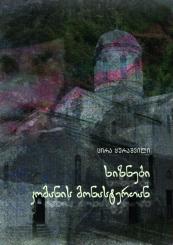THE REFUGEES AT KUMANI MONASTERY
KURASHVILI TSIRA
Some of the writer’s prose works have been gathered together in the collection Refugees by Komani Monastery. They deal with women’s experiences of history, religion, family life. The stream of consciousness in the stories is so convincing as the author’s voice, that author and character can no longer be distinguished from one another. In her prose the author uses the grotesque humour already tried out in her poetry, caricatures of archetypical models, mystification, extremely serious, dramatic experiences are rendered comically. In the cycle of stories Don’t Look Back, Kuchiela’s Woman, Teach me How to Be a Writer, Tsira Qurashvili depicts Georgia in the 1990s, split apart, confused. Christian and pagan, national and cosmopolitan, intellectual and philistine, puritanical and free impulses clash chaotically with one another. This is reflected in every way in the conflicts of the characters. What is sincere self-representation for one person is seen by another as immoral; what is holy of holies for one person is perceived as meaningless formulations by another what is a frightful sin for one person is a natural and banal thing for another. The situation seems all the more deplorable because this sort of confusion often happens in the mind of one and the same hero. The language of the stories is very varied from a stylistic point of view. It could be said that several different languages are in use: intellectual, or everyday expression, sometimes archaic and biblical language alternate; Imeretian dialect is used extensively, as are other tendencies. Given the manner of dissonant and harmonized parodic-grotesque speakers we are given every right to speak of Tsira Qurashvili’s written language as an idiosyncratic phenomenon. On the one hand this language clearly conveys to us a specific content; on the other hand, it creates a peculiar, one might say extra content: a lot of what is in the story, in the way the characters express themselves, or the author’s comments, we find such twists and turns that the principle of objective, realistic narration is overturned, you could call it simply pointless if you don’t take into account the stylistics of the works. By such twists the author manages to give us specified additional information and to lay a deliberate artistic accentuation which would be impossible in the framework of a classic narration. Apart from the stories in this cycle, the book also contains miniatures.
‘Don’t Look Back’ is an extremely polished, well-woven text with countless different layers and colours, linguistic manipulations, biblical allusions, retrospective looks at Georgian history. It is a story in which a woman’s experience of religion, history, family life aspects are reflected.’
Lela Samniashvili, poet
‘The impression of abnormality in Tsira Qurashvili’s story ‘Don’t Look Back’ is not something that the abnormal provincial social and political background shown in it and the main character’s extraordinary openness could create, were it not for the brilliantly managed ‘abnormal vocabulary’. In Georgian, after all, dialect is normally used for humour (NodarDumbadze, R. Chaishvili…) But Tsira Qurashvili uses dialect (stylized) to make the nervous charge even more tense.’
Shota Iatashvili, poet, critic
Extract will be available soon
In case of using the information, please, indicate the source.
